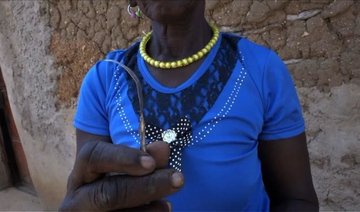BEIRUT: Doctors at two Cairo hospitals will pin blue ribbon badges to the clothing of newborn baby girls on Wednesday as they launch a campaign to persuade parents in Egypt to “say no to female genital mutilation (FGM).”
The country has the highest number of women affected by FGM in the world, with nearly nine in 10 having been cut, according to UN data.
Parents will receive the badges — which resemble the Arabic word “no” and look like an upside down version of awareness ribbons for HIV/AIDS and breast cancer — after signing a pledge that they will not have their daughters cut.
Activists hope more hospitals will join the campaign, which launches on International Day of Zero Tolerance for FGM.
FGM was banned in Egypt in 2008 and criminalized in 2016, but the practice persists, with most procedures now carried out by health professionals.
Many families see FGM as a religious obligation and a way to preserve their daughter’s virginity.
“It is a wrong and ugly belief. We have to make clear that FGM (does not stop) sexual desire,” said pediatric doctor Amira Edris who works at one of the Cairo hospitals.
“I have a veil on my head and I respect religious rules ... but this is not a religious rule — it is a false belief,” she told the Thomson Reuters Foundation.
FGM, which commonly involves the partial or total removal of the external genitalia, is practiced in a swathe of African countries and parts of Asia and the Middle East.
It is often done by traditional cutters with unsterilized blades, but there is an increasing trend for FGM to be carried out by health professionals — particularly in Egypt, Guinea, Kenya, Nigeria and Sudan.
Global anti-FGM group 28 Too Many, which is working with the Egyptian hospitals, said the “medicalization of FGM” was hindering efforts to end the practice.
“By having the backing of hospitals in the campaign, we are showing that FGM is wrong, wherever it is carried out,” said 28 Too Many founder Ann-Marie Wilson.
FGM can cause a host of serious health problems including infections and infertility.
There has been mounting concern over the practice in Egypt following the deaths of several girls during botched procedures.
Edris said she had been particularly affected by the death of a 7-year-old girl from FGM.
“We couldn’t save her ... she bled to death. I remember she started to hallucinate ... and she knew she was going to die — this really traumatized me,” she said.
Amel Fahmy, director of women’s advocacy group Tadwein which is backing the campaign, said doctors were ideally placed to spread awareness of FGM.
“We can’t be shy about this. It’s time to talk about this as a harmful practice, and for doctors to tell parents you shouldn’t do this to your daughter,” she said.
What is female genital mutilation and where does it happen?
World leaders have pledged to eradicate female genital mutilation (FGM) by 2030, but campaigners say the ancient ritual remains deeply entrenched in many places.
International Day of Zero Tolerance for Female Genital Mutilation on Wednesday will highlight efforts to end the widely condemned practice thought to affect at least 200 million girls and women globally. Here are some facts:
• FGM dates back over 2,000 years and is practiced across many cultures and religions.
• It is practiced in at least 30 countries, mostly in Africa but also in pockets of the Middle East and Asia.
• FGM typically involves the partial or total removal of the external genitalia. In some cases the vaginal opening is sewn up. Other procedures, more common in parts of Asia, include nicking or pricking the clitoris.
• FGM can cause longlasting mental and physical health problems including chronic infections, menstrual problems, infertility, pregnancy and childbirth complications.
• Somalia has the world’s highest FGM prevalence (98 percent of women have been cut), followed by Guinea, Djibouti, Mali and Sierra Leone.
• Of the 28 countries in Africa where FGM is endemic, 22 have legislation criminalizing FGM, although enforcement is generally weak and prosecutions rare.
• Half of all girls who have undergone FGM or are at risk live in three countries — Egypt, Ethiopia and Nigeria — all of which have laws against FGM.
• Chad, Liberia, Mali, Sierra Leone, Somalia and Sudan, which are home to 16 million girls, have no law.
• There is an increasing trend for FGM to be carried out by health professionals rather than traditional cutters, particularly in Egypt, Guinea, Kenya, Nigeria and Sudan.
• The ritual, often justified for cultural or religious reasons, is underpinned by the desire to control female sexuality.
• Somalia and Somaliland are drafting laws against FGM.
• Despite not yet having a law, Somalia announced its first FGM prosecution last year after a 10-year-old girl died.
— Compiled by Reuters












